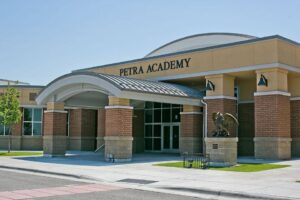Interest in classical Christian education is on the rise
As Christian schools see record enrollment numbers after COVID-19, a subset of this group has also witnessed increased growth in its approach to learning: classical Christian schools.
One such…

As Christian schools see record enrollment numbers after COVID-19, a subset of this group has also witnessed increased growth in its approach to learning: classical Christian schools.
One such example is Whitefield Academy, one of the top three private schools in the Kansas City metropolitan area. Founded in 1995, it has grown to educate 260 students each year – from pre-K through grades 12 in classes of 20 or fewer.
BJ Williams, director of admissions and marketing, said the school’s enrollment numbers had increased by 10 percent this school year.
While this increase remains consistent with previous years, she said, several of the new families surveyed said that dissatisfaction with public schooling (associated with COVID-19 policies) caused them to look for other options.
“Classical and Christian education at Whitefield Academy seeks inner transformation of the student to understand what it is to live a Christian life,” Williams said.
‘Transformational, not transactional’
Williams heard about the classical Christian approach when a former head of the school shared Dorothy Sayers’ book The Lost Tools of Learning with her.
“The book is not the end-all explanation for classical education, but makes some good points as to why do it,” she said.
Whitefield Academy is accredited by the Association of Classical Christian Schools (ACCS), which was founded in 1994 and now represents more than 290 member schools.
The association explains how the Greek word paideia (which has no exact English translation) relates to the philosophy of classical education.
“It is essentially the part of upbringing and education that forms the soul of a human being — and it is key to the formation of a culture,” it writes on this webpage.
“Classical education considers the whole person, including their worldview, habits, thought patterns, character, and culture. As a person grows up, they absorb their surroundings, not just the answers to test questions. Their education shapes who they are, and how they see the world and act within it. Education should be first and foremost about the cultivation of virtue and a deep appreciation of truth, goodness, and beauty in the souls of our kids.”
Williams said Whitefield Academy’s participation with the ACCS provides numerous benefits to school officials such as continuing education, discussion forums, mentoring, and networking.
“They hold us to a standard that is higher than other Christian-based or secular accrediting organizations,” she said.
The association also helps the school with its classical and Christian approach to learning, Williams said, which emphasizes the formation of the whole person.
“It is transformational, not transactional,” she said.
Common misconceptions
Williams said she often encounters misconceptions about Christian classical education, including the assumption that its rigorous standards can be too difficult for today’s generation.
“It is not difficult because our teachers teach students how to learn,” she said.
In addition, Williams said, Christian classical education can benefit all children regardless of their giftedness or skill level – even if they start the approach later in their academic journey.
“Children can transfer in at any age and benefit,” she said.
Other proponents of classical education agree with Williams. Brandon McCoy in a recent opinion column for Newsweek profiled three classical charter schools to measure their progress among historically disadvantaged communities.
One of the schools, South Bronx Classical, had almost 100 percent proficiency in both English language arts and math for all its students. Nearby district schools, however, had a proficiency rate around 30 percent.
“While the three schools are not representative of all forms of classical learning, their data suggest that classical education can successfully reach students of all backgrounds,” McCoy writes.
McCoy also believes that classical education can help students navigate the current “culture wars” by training them to focus on the goal of advancing truth and a set of consistent values.
“Students will often face challenges to their own perspectives—not to tear them down, but to build them up,” he writes. “As students master the subject, they will be able to identify historical forces that brought us to the current moment, contextualize humanity’s successes and failures and analyze what they may mean for our future.”
Parents can also choose their level of involvement with classical education and their students’ learning, even if they have no previous experience with it.
Whitefield Academy encourages parent participation through its Parent Teacher Fellowship program. Some parents choose to be very involved and will join in school classes during the week. Others will attend school plays and concerts, athletic events and community gatherings as their schedule allows, Williams said.
Next steps
If parents are interested in classical Christian education for their children, they can choose from several options: private, charter, micro-school and homeschool.
Williams recommends talking with other parents who already have children enrolled to compare financial strategies.
“At times grandparents or other family members are in a position to supplement the cost of tuition,” she said.
Whitefield Academy also offers financial aid resources on its website, where parents in need can apply for community scholarships.
Private gifts also help offset the cost of educating each student, as the school estimates the actual cost of its programs are 14 percent higher than current tuition rates.
Additionally, Williams said, some families invest in 529 education savings plans to help cover enrollment costs. Students can use their plans to pay up to $10,000 each year for their tuition at public, private or religious schools.
Preparing students for life
Proponents of classical Christian education emphasize that it seeks to prepare its students not only for the classroom, but for a lifetime of learning. When done correctly, this educational approach is not about teaching students what to think, but how to think.
Williams says while academic excellence is important, it should not be the only outcome of a successful education.
“Though our academics are at the highest level, it is not about pumping academic content into the student for the sake of a knowledge-base,” she said. “It is about helping each student in decision-making and learning in all aspects of life.”



